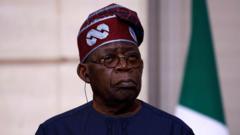In Nigeria, growing criticisms of President Bola Tinubu's appointments favoring the Yoruba ethnic group threaten the longstanding tradition of ethnic balance in government. Observers fear the implications for national unity as key positions become overwhelmingly monopolized, raising alarms among various communities.
Nigeria's Ethnic Representation in Presidential Appointments Under Scrutiny

Nigeria's Ethnic Representation in Presidential Appointments Under Scrutiny
Concerns are mounting over President Bola Tinubu’s ethnic favoritism in key government roles, stirring fears of unrest in Nigeria's diverse society.
In Nigerian politics, an unwritten agreement has long dictated that presidential roles should reflect the country's intricate ethnic and religious fabric. However, recent concerns indicate a potential breach of this crucial social contract. Critics argue that President Bola Tinubu, now in office for two years, has shown a preference for his Yoruba ethnic group in key appointments, flouting precedent and stirring tension among Nigeria's diverse populace.
While the Nigerian constitution mandates regional representation within the cabinet, the informal norms aimed at promoting harmony have historically shaped the appointment of other vital governmental positions—a practice under scrutiny as critics voice their dismay. With over 250 ethnic groups and the Hausa-Fulani, Igbo, and Yoruba being the most prominent, the scrutiny over appointments remains high. Many believe that favoritism in leadership positions can exacerbate the divisions that have previously threatened Nigeria’s unity.
Tinubu’s selection of northern Muslims, including his running mate, sparked a debate over adherence to the established mixed Muslim-Christian ticket custom. Since taking office in May 2023, widespread criticism has emerged surrounding his appointments. Political analyst Lawal Lawal highlights eight pivotal roles essential for any administration—central bank head, police chief, and army commander among them—that collectively influence the country’s financial and security systems.
As of April, all eight of such crucial roles are occupied by individuals of Yoruba descent. The latest appointment of Bayo Ojulari as head of the Nigerian National Petroleum Company (NNPC), replacing a northerner, intensified fears of ethnic dominance in government. Past leaders like Goodluck Jonathan and Muhammadu Buhari maintained more balanced ethnic compositions within their administrations, yet Tinubu’s current situation marks an unprecedented concentration of power among one ethnic group.
History professor Tijjani Naniya warns that this trend could undermine Nigerian democracy, eroding feelings of belonging among various communities. There is rising alarm particularly among northern constituents who sense exclusion from top roles. Specific appointments, such as the recent replacement of Abdulrasheed Bawa, a Hausa, as head of the Economic and Financial Crimes Commission, have only fueled these sentiments of marginalization.
Despite controversy, Tinubu’s administration insists that appointments are conducted fairly, claiming overall diversity in appointments across regions. However, internal dissent from within his party showcases the issue’s contentious nature, as leaders express their concern over inclusivity and representational equity.
While some analysts advocate for the appointment of individuals based purely on merit—regardless of ethnic affiliation—the notion of transcending ethnicity in Nigeria’s political framework appears a distant aspiration. Historians assert that a future with equitable representation requires sustained commitment from multiple leaders, striving to foster a sense of belonging across Nigeria’s diverse population.
As the nation grapples with its complexity, the struggle for balanced representation in government remains critical for ensuring Nigeria’s political stability and unity.
While the Nigerian constitution mandates regional representation within the cabinet, the informal norms aimed at promoting harmony have historically shaped the appointment of other vital governmental positions—a practice under scrutiny as critics voice their dismay. With over 250 ethnic groups and the Hausa-Fulani, Igbo, and Yoruba being the most prominent, the scrutiny over appointments remains high. Many believe that favoritism in leadership positions can exacerbate the divisions that have previously threatened Nigeria’s unity.
Tinubu’s selection of northern Muslims, including his running mate, sparked a debate over adherence to the established mixed Muslim-Christian ticket custom. Since taking office in May 2023, widespread criticism has emerged surrounding his appointments. Political analyst Lawal Lawal highlights eight pivotal roles essential for any administration—central bank head, police chief, and army commander among them—that collectively influence the country’s financial and security systems.
As of April, all eight of such crucial roles are occupied by individuals of Yoruba descent. The latest appointment of Bayo Ojulari as head of the Nigerian National Petroleum Company (NNPC), replacing a northerner, intensified fears of ethnic dominance in government. Past leaders like Goodluck Jonathan and Muhammadu Buhari maintained more balanced ethnic compositions within their administrations, yet Tinubu’s current situation marks an unprecedented concentration of power among one ethnic group.
History professor Tijjani Naniya warns that this trend could undermine Nigerian democracy, eroding feelings of belonging among various communities. There is rising alarm particularly among northern constituents who sense exclusion from top roles. Specific appointments, such as the recent replacement of Abdulrasheed Bawa, a Hausa, as head of the Economic and Financial Crimes Commission, have only fueled these sentiments of marginalization.
Despite controversy, Tinubu’s administration insists that appointments are conducted fairly, claiming overall diversity in appointments across regions. However, internal dissent from within his party showcases the issue’s contentious nature, as leaders express their concern over inclusivity and representational equity.
While some analysts advocate for the appointment of individuals based purely on merit—regardless of ethnic affiliation—the notion of transcending ethnicity in Nigeria’s political framework appears a distant aspiration. Historians assert that a future with equitable representation requires sustained commitment from multiple leaders, striving to foster a sense of belonging across Nigeria’s diverse population.
As the nation grapples with its complexity, the struggle for balanced representation in government remains critical for ensuring Nigeria’s political stability and unity.



















